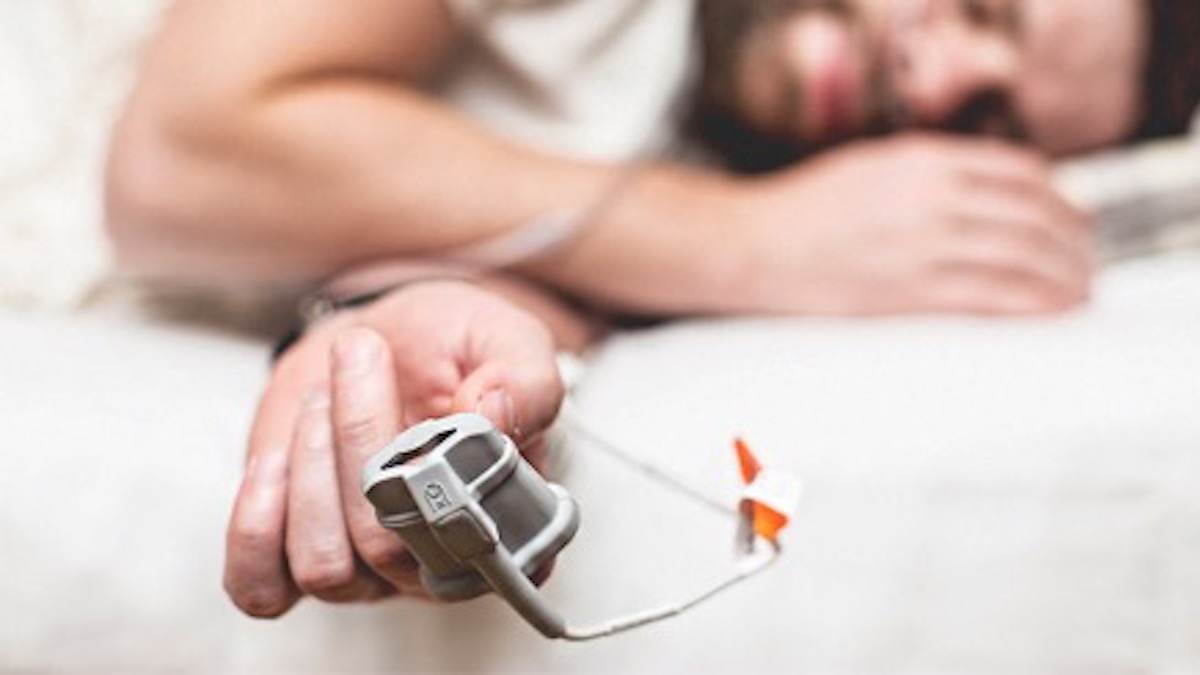Key Takeaways:
- As a person gets older, their risk for both sleep apnea and dementia increases due to natural aging changes in the body.
- Those who live with undiagnosed or untreated sleep apnea have an even higher risk of developing other health implications, including dementia.
- It is important to be aware of sleep apnea symptoms, especially in those who have dementia, including chronic snoring and loss of breath in episodes while sleeping.
Patients living with untreated obstructive sleep apnea (OSA) can experience a number of symptoms ranging from excessive daytime fatigue to cognitive impairment. Due to the prevalence of OSA in older individuals, researchers set out to determine if there was a link between sleep apnea and the onset of dementia and Alzheimer’s Disease.

Understanding Sleep Apnea
Sleep apnea is a sleep disorder in which the airway closes periodically throughout the night, resulting in disrupted sleep. Obstructive sleep apnea (OSA) is the most common form of sleep apnea with the throat muscles closing at night and causing the “apneas” that disrupt sleep. Central sleep apnea is caused by brain signals that misfire and cause the airway to close. Complex sleep apnea is a combination of OSA and central sleep apnea.
Sleep apnea symptoms may include:
- Loud snoring
- Gasping for air at night
- Morning headaches
- Daytime drowsiness
- Cognitive issues including memory loss and difficulty concentrating
Identifying the symptoms of sleep apnea and getting a diagnosis early helps prevent other sleep apnea-related health issues later. Learn more about sleep apnea.
What is Dementia?
Dementia is the loss of cognitive ability, usually as we age. Cognitive loss may include memory, language or problem-solving and other thought capacities. Dementia covers a range of more specific cognitive disorders including Alzheimer’s disease, vascular dementia and Lewy body dementia.
Dementia patients may experience symptoms such as:
- Memory loss
- Confusion
- Perception issues (seeing or hearing things)
- Difficulty with daily tasks
Dementia has a range of causes but is generally related to degenerative brain damage. Genetics, changes in brain chemistry due to trauma or substance abuse, and brain-related health issues are all risk factors for developing dementia later in life.
Can Sleep Apnea Cause Memory Loss?
Is there a link between sleep apnea and dementia? Science is still searching for a definitive answer. However, research has detected a correlation between sleep deprivation due to sleep apnea and cognitive issues and memory loss.
Science does know that frequent sleep apnea episodes deprive the brain of essential oxygen. Blood oxygen levels in sleep apnea patients are always much lower compared to individuals without sleep apnea. Ongoing low blood oxygen levels can eventually cause brain cell damage that may result in dementia.
A Boston researcher conducted a study that found that having sleep apnea symptoms correlated with a 50% increase in memory and thinking problems.
Other studies published in the medical journal Sleep found evidence that individuals with OSA are significantly impaired when compared to healthy individuals when it came to recall and cognition.
Do Dementia Patients Have Trouble Sleeping?
Sleep disorders such as insomnia and obstructed sleep apnea affect dementia patients. Both disorders reduce healthy sleep which impacts brain health. If insomnia is not linked to other disorders such as depression, it may be a part of an individual’s dementia. Sleep loss among dementia patients is also often due to shorter periods of healthy sleep. Reduced sleep time can increase proteins linked to the development of Alzheimer’s disease.
Patients who regularly experience OSA may also be losing sleep and causing irreparable damage to the brain, worsening dementia symptoms. Consistent patterns of OSA lead to difficulty focusing and making decisions. Your motor skills become slower. All of these symptoms impact the effects of dementia.
Can Poor Sleep Lead to Dementia?
Dementia may not only cause poor sleep but may be the direct result of unhealthy sleep behaviors at an earlier age. Early onset dementia can be associated with chronic sleep loss due to insomnia. Sleep loss affects even healthy brains and can begin degrading brain function long before a dementia diagnosis.
As the brain tries to adapt to erratic or limited patterns of sleep, chemicals in the brain are released. These chemicals over time change the brain drastically. Many of the symptoms associated with sleep loss such as poor concentration and memory are the same tell-tale signs that dementia is starting early.
How Does Sleep Apnea Contribute to Dementia?
Sleep apnea is from the complete or partial closing of the airway during sleep. This blockage prevents oxygen from entering the body and flowing to the brain. These events can happen as frequently as 30 times or more per hour in severe cases.
Some of the most common symptoms of sleep apnea include cognitive impairment (i.e. forgetfulness, lack of concentration, etc.). These same symptoms are often related to the clinical onset of dementia and Alzheimer’s Disease in elderly patients. A review published in the Journal of Alzheimer’s Disease examined several studies to determine if OSA and cognitive impairment, such as Alzheimer’s, were linked.
One study examined sleep-disordered breathing (SDB) among elderly women and found that 44.8% of study participants with SDB developed cognitive impairment or dementia. Only 31.1% of women without SDB developed dementia.1
Can Dementia Lead to An Onset of Sleep Apnea?
Dementia affects sleep because it alters the circadian rhythms that are essential for coordinating sleeping and waking behaviors. The shift in these sleep cycles due to a decline in cognitive abilities and brain function in dementia patients leads to erratic sleep patterns including insomnia. Some dementia patients may also develop sleep apnea as a result.
Obstructive sleep apnea is particularly common with Alzheimer’s disease, occurring in 40% of patients. Having OSA also increases one’s risk of developing dementia. The onset of sleep apnea can only further worsen dementia symptoms and become a vicious cycle of lost sleep and declining brain function.
How Does Sleep Prevent Dementia?
There is not a lot of evidence surrounding the treatment of obstructive sleep apnea to treat dementia or Alzheimer’s. Currently, the most effective form of treatment against sleep apnea is CPAP therapy. A study published in Neurology found that patients with untreated sleep apnea experienced onset of dementia approximately 10 years earlier than those without SDB.2
Patients using CPAP therapy experienced the onset of dementia and cognitive impairment 10 years later than those who were not treated for their sleep apnea. While promising, these results only occurred in two out of three study groups.
Lifestyle Changes to Reduce Risk

Reducing the impact of sleep apnea through lifestyle changes can help promote brain health.
Follow healthy sleep habits including:
- Sticking to a consistent sleep schedule.
- Avoiding alcohol near bedtime.
- Practice meditation or other stress-management breathing techniques to relax before sleep.
- Avoid blue light devices before bed including phones, TVs and computers.
Maintaining an exercise routine and healthy diet both benefit brain health and sleep. These habits include:
- Maintaining a healthy body weight
- Following a healthy diet low in fat and high in fiber
- Staying active either through an exercise routine or just daily walks
Keep your brain healthy with varied forms of mental stimulation.
- Try reading regularly.
- Work on brain-teaser puzzles and games.
- Engage socially with others to stay mentally stimulated through conversation and empathy.
- Follow steps to minimize stress with yoga to meditation.
Prioritizing Sleep for a Healthy Mind
Getting a diagnosing and pursuing treatment for sleep apnea is important for future health, especially brain health and cognitive function. While you can follow improved lifestyle habits to enhance the quality of your sleep, you should also follow up on any concerns about sleep apnea.
Left undiagnosed, sleep apnea can cause numerous health issues including increasing the risk of dementia. Speak to your doctor about next steps if you notice any sleep apnea symptoms.
How Can a Dementia Patient Know If They Have Sleep Apnea?
You can know for sure if you have sleep apnea with a simple home test. Visit Sleep Care Online to receive a home sleep apnea test that you can take on your own time in the comfort of your own home. It is safe, easy, and affordable! Learn more at Sleep Care Online.
References
- Yaffe K, Laffan AM, Harrison SL, et al. Journal of the American Medical Association. Sleep-disordered breathing, hypoxia, and risk of mild cognitive impairment and dementia in older women. Published 2011 Aug 10. Accessed July 2020.
- Osorio RS, Gumb T, Pirraglia E, et al. Neurology. Sleep-disordered breathing advances cognitive decline in the elderly. 2015 May 12. Accessed July 2020.




